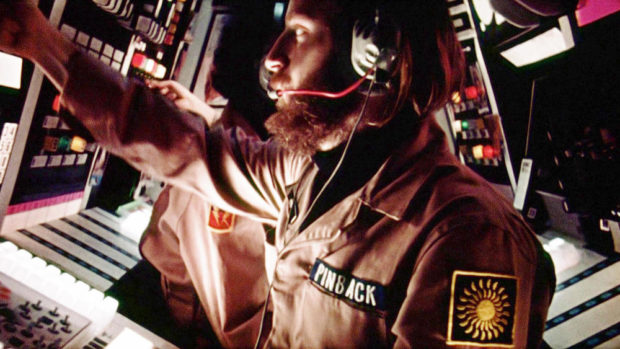 John Carpenter’s first feature, a low budget science fiction comedy, drily exposes the complete inadequacy of human beings when measured against the cosmos.
John Carpenter’s first feature, a low budget science fiction comedy, drily exposes the complete inadequacy of human beings when measured against the cosmos.
John Carpenter is known primarily as a director of popular genre pictures, mostly in horror (such as Halloween, the film that made his career), action thrillers, and science fiction. Being a film snob, I haven’t been as receptive to his work as others, although I’d be a fool not to acknowledge his obvious talent. It was with unexpected delight, then, that I recently watched his very first feature film, Dark Star. This was a student film at first, co-written by Carpenter and his friend Dan O’Bannon, who had experience in editing and special effects, and also acted in the picture. Later they found a backer to finance it as a full-length movie, and it cost about 60 grand to make, but just as they finished it in 1974, their producer went bankrupt, so the film didn’t get proper distribution until later. The cheap, makeshift production values of this science fiction film shouldn’t put you off—it’s fine just the way it is.
Dark Star is the name of a spaceship manned by four astronauts in the 22nd century—they’ve been on a mission for twenty years, although they’ve only aged three. Their job is to destroy unstable planets in solar systems that are possible sites for future colonization. At this point they are thoroughly demoralized and bored out of their minds. The ship has been malfunctioning in various ways—most seriously by killing the former commander with an electrical short during a transition to hyperdrive. The commander is dead, but his body has been preserved in a cryogenic state. They’ve also kept an alien life form onboard as a pet—it appears to be a sentient beach ball.
Yes, it’s a comedy—a very dry, laid back comedy. In most space travel films or TV shows, the characters stride about in their crisp, good-looking uniforms while employing shiny, complex forms of technology. In Dark Star, on the other hand, we observe the slovenly crew members taking breaks together, sniping at each other and smoking cigarettes, and the contrast with what we expect from science fiction is intentional and, at least for me, hilarious.
Even the rather substandard acting serves the movie’s purpose. We have every reason, in this vision of the future, to accept the inarticulate and mildly incompetent affect of the characters, one of whom has decided to just stay in an observation bubble at the top of the ship grooving on the spectacle of the universe, another shoots targets with a laser all day in order to pass the time, and a third obsesses about his former life as a surfer. Pinback, the astronaut played by O’Bannon, ends up releasing the beach ball—I mean the alien—by accident and goes through hell to try and get it back.
But besides turning the genre inside out, Dark Star satirizes the human belief in progress. What we witness—and in its own way this is totally convincing despite being comic—is the complete inadequacy of human beings when measured against the cosmos. The highlight of the film, for me, is a sequence in which the chief surviving officer, Doolittle, engages in a philosophical argument about Cartesian doubt and phenomenology with a computerized bomb in order to persuade it not to blow everything up. Dark Star is just modest enough to be effective as an antidote to grandiosity, in film and in life.

Two biographical films tell the stories of two remarkable women: Dolores Huerta, co-founder of the United Farm Workers; and Chavela Vargas, groundbreaking ranchera singer....

Artist and director Ulrike Ottinger presents her recollections of living and working in Paris in the 1960s. Paris Calligrammes: that’s not exactly a movie...

The work of the film innovator who brought fantasy and illusion to the movies, is presented in a documentary and a collection of Georges...